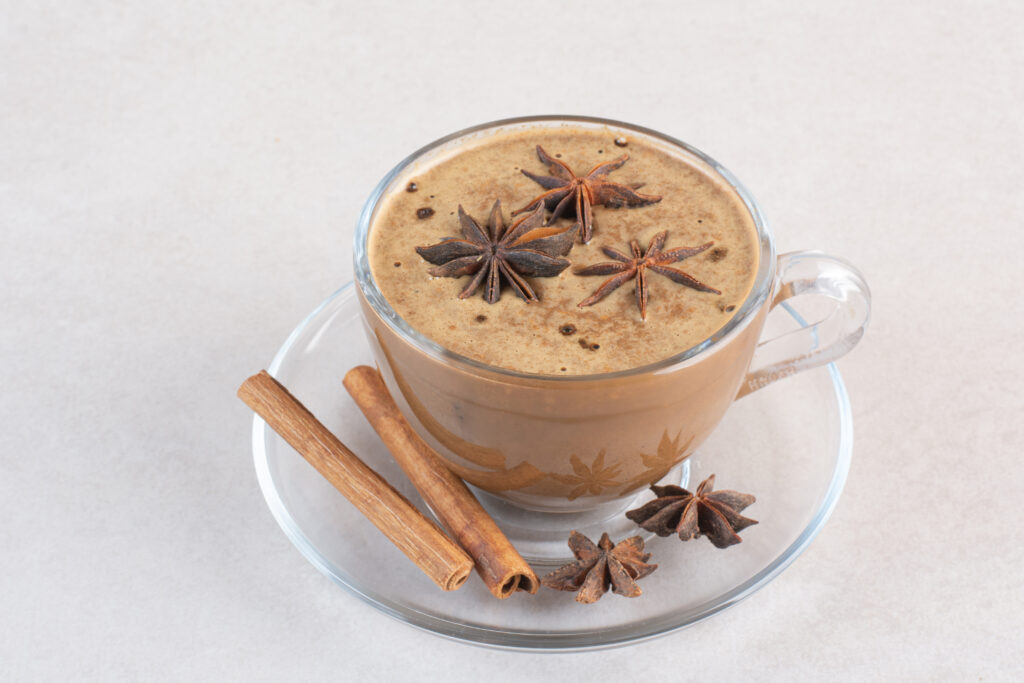
Since the 1990s, chai or a chai latte have been on beverage menus at coffee shops across the US. They are plenty of fans around the globe, but have you tried it? Not sure what it is or how it tastes? It’s ok if you’ve been a little chai shy—we’re spilling the tea on this popular beverage.
What is chai?
The British colonization of India and the widespread growing of tea eventually led the Indian people to become a nation of tea-drinkers. Chai (meaning “tea”) is the Indian spin on tea. It’s made with black tea, milk, sugar, and aromatic and flavorful spices such as cinnamon, cardamom, ginger, and pepper. By the early 1900s, it was a common daily beverage among the Indian people.
Masala chai is actually the more accurate name for chai, meaning “spiced tea.” The exact components and ratios of its ingredients vary from region to region in India. Mass producers adjust the recipes for masala chai-flavored tea bags and syrups to better suit Western tastes. As a result, love for the sweet and spicy beverage has spread. And, for the record, a “chai latte” is a shot of chai spice concentrate in a cup of steamed milk. This creates a beverage that is significantly more milky than traditional chai.
Does chai have health benefits?
Scientific studies link the ingredients in a typical chai to several health benefits. But you may need to drink multiple cups of chai or chai lattes per day to consume the necessary amounts of these ingredients. Here are some of the health benefits from chai’s ingredients:
- May lower blood sugar levels and lessen insulin resistance: In general, both ginger and cinnamon can help decrease blood sugar levels. There are conflicting studies, however, and we need more research. In one study, cinnamon improved insulin resistance in women with polycystic ovary disease. And several studies have shown small improvements in blood sugar levels and glycemic response from consuming cinnamon. Ginger has also had positive effects on blood glucose levels in populations with non-alcoholic fatty liver disease as well as women with gestational diabetes. Of course, neither of these spices are a replacement for medication. But as an adjunct to medicine and a healthy eating plan, chai may be beneficial. Be sure to consult your doctor before implementing a regular chai routine if you are pregnant or have type 2 diabetes, prediabetes, or insulin resistance. And read more about warm spices and their potential health impacts here.
- Provides protein: Due to its milk content, chai—especially chai lattes—can contribute a good amount of protein. However, if your chai latte has non-dairy milk, the protein content will not be the same. Soy milk or pea-based alternative milks are a good option because they have higher protein levels. But many other alternative milks are significantly lower in protein than soy or dairy milk.
- May lower blood pressure: Studies indicate that several cups of black tea daily can have a small but beneficial impact on blood pressure levels.
- May help manage weight: Chai contains black tea, which has some different bioactive compounds than green tea. Research shows that both types may have an impact on weight control and weight loss. The milk protein in chai can also help promote fullness (from the protein and fat content), perhaps leading to less snacking and overeating. However, it’s important to watch chai’s sugar level as well as the milk’s fat level. Not surprisingly, multiple sugary beverages per day can counteract any weight management benefits chai may provide. Opt for skim milk or 1% milk chai when available.
Can I make my own chai?
Absolutely! You’ll know you’re using high-quality ingredients, and can make it to your liking. Using whole spices and grinding them up yourself is the most authentic way to make a traditional masala chai mixture. (Here’s a recipe I like.) You may also reap more health benefits from those spices. They’ll likely be fresher and free of other ingredients like sweeteners that come with chai-flavored mixes and syrups. There are a couple of chai-spiced, or chai-inspired, Guiding Star-earning recipes on our website. Check out this Chai Smoothie, which you can serve cold or warmed, and this banana-based Chai “Nice” Cream.
Chilly winter months are the perfect time to give warm, fragrant, and comforting chai a try.